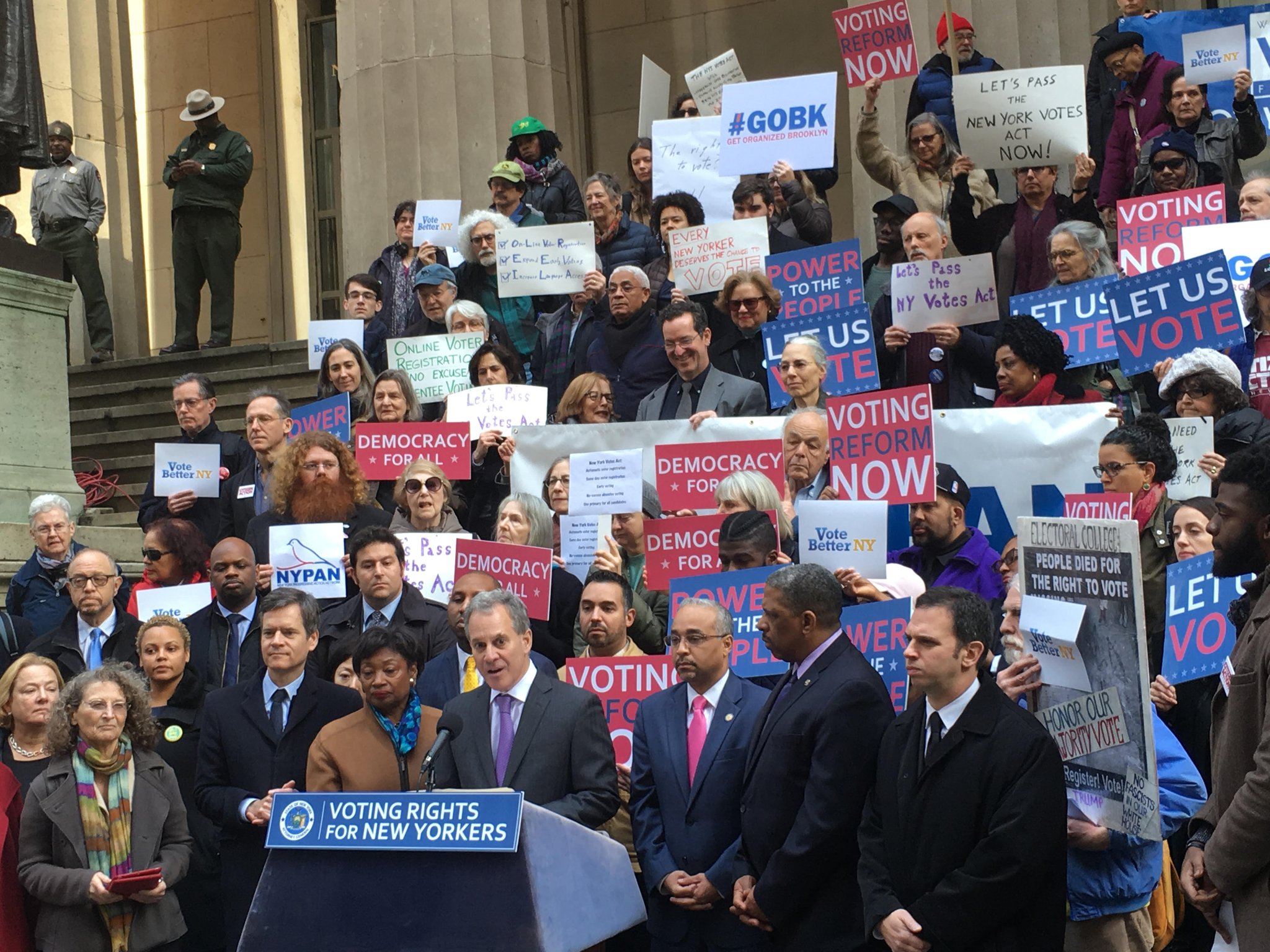
Attorney General Schneiderman (photo: @AGSchneiderman)
Last week, Attorney General Eric Schneiderman stood before a crowd of New Yorkers gathered at Federal Hall and announced the introduction of a comprehensive reform bill aimed at expanding voting rights in New York. I applaud his leadership on this issue but he misses a critical point.
New York has some of the worst elections laws in the country. Among other backwards anti-voting provisions, New York has no early voting (unlike 37 states), a partisan board of elections, excuse-only absentee balloting, antiquated voting systems and holds multiple primary elections on different dates. Voters had to change their party registrations more than a full six months before the April 2016 presidential primary, before all the candidates were even identified.
The massive impediment to voting in New York is not administrative and it is by no means passive; it’s the intentional denial of the voting rights of 3.2 million independent and third-party New Yorkers because of our system of closed primaries, in which only registered voters from the two main political parties can cast a ballot for their party’s candidate. To put that in perspective, that is half a million more voters than are registered with the Republican Party in New York. It's also more than the total number of registered voters in the entire states of Vermont, North Dakota, South Dakota, Delaware, and Montana combined. Why does New York State believe that it has the right to dictate its citizens’ conscience?
Like those 3.2 million other independently minded New Yorkers, I am denied my basic rights as a citizen in our democracy. I was shut out of the 2016 primary elections, one of the most consequential elections in my lifetime. Why? Because I chose not to join a political party in order to exercise my right to vote. That’s not right and the 2016 primary elections perfectly illustrate why. On October 9, 2015 (the date by which New Yorkers had to change their registrations in order to vote in the primaries), few had heard of Bernie Sanders and even fewer believed that Donald Trump would become the Republican party nominee. By April, both had gained popular support among their party's voters and energized the electorate, many of whom could not cast their ballots for them. These facts demonstrate that the ability to vote in a primary is far more significant than the ability to vote in a general election.
New York’s primary elections are not simply private party nominating contests, a deceit that is often used to justify voter disenfranchisement, and which intentionally obfuscates the fact that primaries are publicly run and paid for with millions of dollars of taxpayer money. New York’s primary elections are administered in public buildings and run by publicly paid for employees on publicly owned machines. They differ from the general election in one key respect only, that they exclude 3.2 million voters and prevent millions more major party voters from exercising real choice in voting.
It’s no wonder New York has one of the lowest voter turnout rates in the country. Only 19.7 percent of registered New Yorkers cast a ballot in last April’s presidential primary, the second-lowest voter turnout among primary states after Louisiana. I fully support the attorney general’s work to improve our system of voting in New York, but how can we have a serious conversation about voting rights in New York when we ignore the fact that currently in New York, 33 percent of millennial voters, 33 percent of Asian voters, 20 percent of Latino voters and 15 percent of African-American voters who don’t belong to one of the two major political parties are shut out of voting in primary elections.
Accordingly, I brought a lawsuit challenging New York’s failing system of primary elections. While my lawsuit does not directly challenge New York’s closed primary system (because I believe that discrete question is one for the legislature), it does specifically challenge the constitutionality of that provision of the election law requiring a change of party affiliation more than six months in advance of a primary election – likely at a point in time when a voter will not have had any meaningful opportunity to make up her mind. If the right to vote is to mean anything, that right must be meaningful. While the attorney general is my opponent in these proceedings, he fully supports jettisoning the provision of the election law that I challenged, and essentially recognizes its unconstitutionality. Ironically, AG Schneiderman’s first public announcement of his voting reforms took place on December 6, 2016 at the very same moment – literally – that his office was opposing my efforts to open the system up.
Nonetheless, in his remarks last week, the Attorney General said that more people voting is good for our political parties and that anything that expands voting rights is a good thing. I agree, and encourage him to embrace open primaries and further open our democracy in New York State.
It is not debatable that every eligible New Yorker should have the right to vote for who they want in every election.
***
Mark Moody is a New York City-based attorney in private practice.
***
Have an op-ed idea or submission for Gotham Gazette? Email This email address is being protected from spambots. You need JavaScript enabled to view it.




